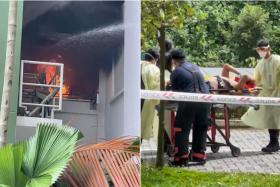After rescue, a close shave
Hours after last person trapped inside Thai cave was taken out, 100 workers had to flee rising flood waters
In the end, the thin line between success and possible failure in the Thai cave rescue came down to a matter of hours.
Any delay in moving the last five people out of Tham Luang cave in northern Thailand on Tuesday could have led to a different outcome of the rescue effort dubbed "Mission Impossible", it was revealed yesterday.
When the 12 boys and their coach from the Wild Boar football academy were found on July 2, nine days after being trapped by flood waters 4km from the cave entrance, pumps were used to keep the water at bay.
Six days later, on Sunday, the rescue operation began as four boys were taken out safely in perilous conditions, followed by another four the next day.
On Tuesday evening, coach Ekkapol Chantawong, 25, was the last man out. Then, three hours later, the pumps stopped working.
It was something the rescue workers had been dreading in their race against time to save the group.
More than 100 rescue workers were inside the cave celebrating the successful rescue , members of the Australian diving team, who asked not to be identified, told The Sydney Morning Herald.
"There were 100 guys running down the hill and the water was coming. The water was noticeably rising. You could see it rising," one of them said.
The three Australian divers stationed at "chamber three", a base inside the cave, said they heard screaming and saw a rush of head torches from deeper inside the tunnel as workers scrambled to reach dry ground, the Guardian reported.
"The screams started coming because the main pumps failed and the water started rising," said one diver.
"All these headlights start coming over the hill and the water was coming ... It was noticeably rising."
Fortunately, all the workers managed to get out safely in less than an hour. Among them were the last three Thai Navy Seals and Australian doctor Richard Harris, who had spent much of the past week keeping vigil with the trapped boys, the Guardian said.
More details have emerged of the miraculous rescue, including how the boys were sedated for their journey out of the cave.
Dr Harris, who has 30 years of cave-diving experience and is known for his ability to retrieve people from difficult places, had come up with the idea of giving the boys, many of whom cannot swim, a mild sedative to ensure they did not panic while underwater, the Daily Mail reported.
A former Thai Navy Seal who was the last diver to leave the Tham Luang complex told AFP yesterday the boys were passed "sleeping" on stretchers through the treacherous pathways.
"Some of them were asleep, some of them were wiggling their fingers... (as if) groggy, but they were breathing," Commander Chaiyananta Peeranarong said, adding that doctors stationed along the dark corridors of the cave were constantly checking their condition and pulse.
"My job was to transfer them along," he said, adding the "boys were wrapped up in stretchers already when they were being transferred".
'MINOR TRANQUILISER'
Thai Prime Minister Prayut Chan-o-cha told reporters on Tuesday that the group had been given a "minor tranquiliser" to help calm their nerves. But he denied they were knocked out for the rescue.
The boys, aged 11 to 16, had no experience in scuba diving, and the death of an ex-Navy Seal who had helped install oxygen tanks in preparation for the rescue underscored the dangers of the mission.
Thailand said it had called on 13 "world-class" divers to help with the unprecedented job, including Dr Harris.
Rescue chief Narongsak Osottanakorn told reporters yesterday that the operation would not have been possible without the unique skills that Dr Harris brought to the mission, though he did not elaborate.
The boys, now in quarantine, are in good health, say the authorities. In a video shown at a press briefing, some of the parents were in tears as they looked through the glass at their children, reported CNN.
The family members were not allowed to enter the room where they are being treated in order to avoid infection, Dr Chaiyawej Thanapaisarn said.
The doctor said three of the boys were being treated for minor cases of pneumonia, but said most would be discharged after about a week.
Speaking to CNN after he left the hospital, Mr Tanawat Viboonrungruang, the father of 11-year-old Titun, said he felt relieved to see his son was "still healthy".
Seeing his son through the glass, he only wanted to hug him, he added.
"I started to cry, everybody started to cry," Mr Tanawat. "I want to say thanks to those who rescued my boy. And helped him to have a new life. It's like a rebirth."
Get The New Paper on your phone with the free TNP app. Download from the Apple App Store or Google Play Store now



